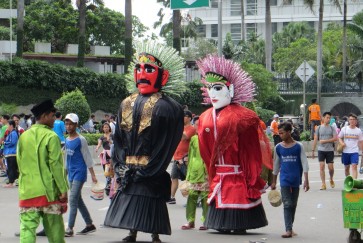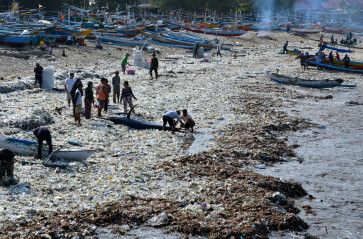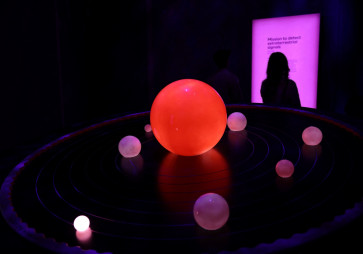Indonesia, land of indulgent beauty treatments
Feeling fresh and relaxed: Masseuses of Seminyak Beach watch attentively as massage techniques are demonstrated by professional spa therapists during a Bali Spa and Wellness event in Kuta on Friday
Change text size
Gift Premium Articles
to Anyone

F
eeling fresh and relaxed: Masseuses of Seminyak Beach watch attentively as massage techniques are demonstrated by professional spa therapists during a Bali Spa and Wellness event in Kuta on Friday. Dozens of Seminyak masseuses attended the training session, during which they learned the proper massage techniques they should use on tourists seeking their services.(JP/Zul Trio Anggono)
Indonesia’s vast cultural heritage, which is shaped by rich gifts derived from nature, inexorably includes a range of beauty regimens. From top to toe, simple to sophisticated, there are choices for everyone.
A common hair treatment found in Indonesian beauty salons is the cream bath that begins with a customer’s hair being washed, followed by the application of cream all over the head as well as a head and shoulder massage. The treatment continues with the hair being steamed, after which the remaining cream is rinsed off.
Indonesian women’s magazine Femina writes that among the natural ingredients used in the cream bath treatment are aloe vera and candle nut. The former is known to stimulate hair growth, while the latter adds shine.
Nonita Respati, the founder of fashion label Purana, is one of many Indonesian women who has a beauty regimen. It includes manicures and pedicures every fortnight, weekly facial masks, hair treatments and a massage twice a week.
Standing out among Nonita’s list is a unique exfoliating step that she does regularly, using a family recipe that was given to her when she was 10 years old.
Now 40, Nonita continues to use the same recipe, which consists of signature Indonesian ingredients, namely turmeric, rice flour, kencur (aromatic ginger), temu giring (Curcuma heyneana), pandan leaves and olive oil.
Besides its deep-rooted values that are tied to local Javanese tradition, from where her parents hail, the mother of two also emphasized its environmentally friendly aspects that keeps her going back to the homemade scrub paste.
“Aside from providing the skin with nutrients, the residue does not damage the environment when thrown away,” Nonita said.
Undoubtedly, it is her cultural heritage that exposed the fashion entrepreneur to Javanese beauty secrets.
The tradition stems from local culture, where beauty regimens using locally sourced ingredients that are homemade are upheld by women, especially in the royal courts.
Nonita explained that her mother hailed from Yogyakarta, while her father is from Surakarta, both regions that are still home to ancient royal families.
“Maybe it’s also a hereditary concoction from the Keraton (palace), I’m not entirely sure. But the person who made the scrub was someone who came from the palace, a courtier,” she said.

Indulgent beauty treatments were once limited to princes and princesses who had access to the best ingredients and assistants who pampered them.
The royal regimen these days, however, is no longer the exclusive domain of courtiers and their social circles. Home-grown brands, some with direct ties to the royal family, have poured out beauty secrets from behind palace doors.
Among the pioneers is Mooryati Soedibyo, the granddaughter of Sri Susuhunan Pakoe Boewono X, the 10th susuhunan (ruler) of Surakarta. A strong cultural upbringing exposed Mooryati to gamelan (Javanese traditional musical instrument), classical dances and Indonesian herbs and spices. From an early age, she learned how to brew jamu (herbal drink) and also concoct other traditional beauty recipes.
In the 1970s she turned this tradition into her own beauty empire, by establishing PT Mustika Ratu that produces herbal medicines and has branches in Jakarta, Semarang, Surabaya, Bandung and Medan. Later it expanded to produce skincare products made of natural ingredients.
Now overseen by Mooryati’s daughter, Putri Kuswisnu Wardani who is the chief executive officer, Mustika Ratu continues to focus on natural ingredients while exposing traditional beauty regimens to the public.
“At the age of 91, Ibu Mooryati still maintains good health as she routinely implements the regimen,” Isabella Silalahi, the company’s marketing and spa director, said.
One of the cornerstones of the company’s lifestyle experiences is the Taman Sari Royal Heritage Spa. The name is inspired by the Taman Sari garden that is within walking distance of the Surakarta Palace, which houses a water palace that is a bathing spot for Javanese royalty.
First opened in Yogyakarta in 1997 and then Jakarta in 2000, treatments offered at the spa are rooted in Surakarta’s royal traditions that aim to balance and harmonize the mind, body and soul.
“[The treatment] focuses on the medium of water and the use of spices and aromatherapy oil from various Indonesian plants such as sandalwood, lemongrass, jasmine and roses, among others, which are empirically proven to provide health benefits and relaxation,” Isabella said.
Staying true to its roots, signature treatments at the spa include “Royal Javanese Pampering” and “Ancient Javanese Healing”, which claim to refresh the body and stimulate blood circulation using traditional techniques and ingredients. Meanwhile a “Javanese Royal Experience” is said to provide an indulgent experience for hair and body treatments, including traditional exfoliation.
Furthermore, the “Seven Flower Ritual Treatment”, which is inspired by traditional ceremonies and seven flowers, promotes balance and hydration.
Also a prominent source of traditional products and treatments is the Martha Tilaar Group, which was founded by Martha Tilaar in 1970. Aiming to uphold a traditional approach to beauty, the company through its spas offers an array of unique treatments dubbed ethno-wellness, with traditional methods sourced from across the archipelago.
Among them is the Javanese “Ken Dedes Princess Ritual” treatment, which consists of several steps starting with the quintessential mandi lulur (exfoliating bath) and the unique ratus vagina (vaginal steam).
It is believed that the ancient beauty treatment originated centuries ago in the palaces of Central Java as a purifying ritual for Javanese princesses as they prepared for their wedding day. The treatments utilize the naturally occurring herbs, spices, food, clay and minerals that were used for the benefit of the royal family.
The mandi lulur, which was known as a royal wedding treatment, is traditionally given to women each day for 40 days preceding their weddings, to soften and prepare their skin for the important day.
The treatment at the spa begins with a foot scrub followed by a traditional Javanese lulur, which is an exfoliating paste made from a blend of finely ground rice, nuts, turmeric root, ginger, cinnamon and sandalwood powder, grounded together with a mortar and pestle.
A little water and a few drops of jasmine oil are then added to form a granular paste. Once the paste is dry it is gently rubbed off to slough away dead skin cells, bringing forth fresh, new skin. The remaining paste is then rinsed off with warm water.
Next, the entire body will be massaged using the traditional Javanese technique, which aims to improve blood circulation and relax the muscles.
After the massage, the “princess” relaxes in a warm bath that is strewn with aromatic cananga flowers and natural herbs. Spicy, natural herbs are also sprinkled in the water.
The last step is the distinctive ratus vagina, which is a traditional technique created for Javanese princesses to freshen and improve the health of the intimate area, as it is traditionally believed to improve blood circulation and relax the pelvic muscles.
Ratus traditionally has been carried out using simple equipment and formulated from natural ingredients by steaming the intimate organ with a special instrument.
“So the process is to sit on a bench with a hole in it while steam from charcoal sprinkled with spices rises from underneath the bench,” explained Dea Cintari, a representative of Martha Tilaar.
This treatment only takes about 10 to 15 minutes. Among the natural herbs used are akar wangi (vetiver), klabet (fenugreek), cananga and sandalwood, which is said to be useful for reducing vaginal discharge, relieving muscle pain and acting as an antiseptic.
The Ken Dedes Princess Ritual treatment concludes with the sipping of fresh ginger tea.
Traditional treatments at Martha Tilaar also draw inspiration from other regions across Indonesia, such as Minahasa in North Sulawesi and South Kalimantan.
Bakera, for instance, is originally a traditional postpartum treatment for women in Minahasa. The Martha Tilaar Spa has modern take on the Bakera, whilst still maintaining the core value that upholds the balance between the body’s “hot and cold elements”.
If one or both of these elements are missing from the human body, it can be replaced with hot and cold elements taken from the surrounding environment.
“Bakera gives us awareness of the importance of being grateful for Indonesia’s natural wealth that is able to naturally care for the body and to maintain a healthy balance,” Dea said.
Sticking to Indonesian culture, the Martha Tilaar Spa Research and Development team packs several types of plants into one Bakera treatment that is beneficial for the body through scrubbing and steaming. Among the plants used are croton, balacai, clove and cinnamon leaves that are believed to act as antibacterial agents.
Then there are the properties of lime, suji and nutmeg leaves that are said to function as antioxidants and help repair damaged cells.
Meanwhile, the lush island of Kalimantan is home to a detoxifying steam bath ritual called Batimung, a beauty regimen dating back to ancient Borneo, which uses natural ingredients such as temu giring, orange leaves, cananga, jasmine, pandan, akar wangi and coconut.
Its properties in detoxification aims to remove toxins and metabolic waste from the body by means of a steam bath with an added variety of flowers, spices and natural herbs to give fragrance to the body. The treatment also includes cengkaruk (body scrub) and ba’urut (body massage).
Batimung steaming itself is a custom of South Kalimantan that is still practiced by the Banjar people. This treatment is one of the rituals traditionally done by the bride and groom, usually on the night before the wedding day, but it can also be done for three to seven consecutive days leading up to the wedding day. With this treatment, the bride and groom are expected to be fresh and fragrant while undergoing the wedding procession.
Batimung, however, does not always have to be done as pre-wedding treatment. It is also good for postpartum, for instance, to make the skin look brighter, smoother, as it helps lift dead skin cells.
Traditional beauty regimens are not only present in special spa treatments but also in everyday routines, such as bedak dingin (cool powder), a mask treatment which can be done at home. Local brand Ovale produces the facial mask.
“Bedak dingin has long been a secret of beauty descended from Indonesian women, including royals. It is not known from which particular area it originated, but bedak dingin is widely used by women in Kalimantan,” said Yuna Kristina, the senior public relations at overseeing company PT Kino Indonesia.
The main ingredients, which comes in the form of rice flour, contains vitamin B and thiamine, are believed to maintain moisture and freshness of the skin and protect it from getting sunburned, says Yuna. Therefore, she adds, it is common for women to apply it before leaving home.









